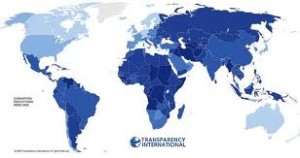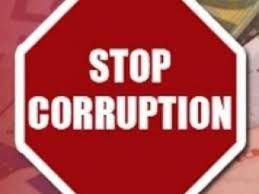Corruption and Economic Development
 Sometimes what we think is obvious is really not so obvious. Sometimes bold conclusions mask nuances or difficult issues. To my surprise, the economic literature surrounding the impact of corruption on economic development is not as clear-cut as everyone thinks.
Sometimes what we think is obvious is really not so obvious. Sometimes bold conclusions mask nuances or difficult issues. To my surprise, the economic literature surrounding the impact of corruption on economic development is not as clear-cut as everyone thinks.
No one argues that corruption is good for a country – the debate among economists (who have a penchant to argue about anything and everything) centers on what, if any, economic harm is caused by corruption.
Economic research around the issue is extensive. Some of the research finds that corruption reduces economic growth. Other research finds that corruption can actually result in efficient mechanisms to bypass suffocating regulatory systems.
For example, one study provides quantitative estimates of the impact of corruption on growth and estimates that a one percent increase in a country’s corruption index reduces the country’s growth rate by 0.545 percentage points. This study cited the most important impact of corruption was on the country’s political stability, along with reductions in private investment and human capital.
Research surveys confirm the fact that corruption reduces private investment. These surveys show that investors are less willing to invest in corrupt economies out of fear that their money will be siphoned off to pay required bribes with little guarantee that the bribe will be successful.
Corruption tends to reduce innovation because innovators depend more on government-supplied licenses, permits, import quotas than established producers need such items. Because of the demand for such government-supplied services, the risk of corruption is higher and innovators are likely to have to pay such bribes because they lack political lobbies and connections to bypass such services. Moreover, innovators are less likely to have access to credit and funds needed to pay bribes. Distortions in private investment and innovation will inevitably lead to inequality in opportunities, frustration and political turmoil.
Few would ever question that corruption has undermined economic development in Africa, Russia and even China. No matter what – corruption can drain an economy by allocating resources inefficiently, skew private investment and slow innovation in an economy.
The context and mix of corruption is very important. Some countries suffer from corruption at the highest levels of leadership; others may suffer from corruption at the lower levels (referred to as “petty corruption”); and others may suffer from both. The dynamics of corruption will depend on the specific mix in a country.
 Corruption clearly undermines political stability. In the long run, political leaders who are committed to corruption will skew political institutions, and economic and regulatory rules, to favor their own private interests. Political instability and economic retardation go hand in hand, and sometimes it is hard to tease out and measure exactly how much corruption impacts political instability and economic growth.
Corruption clearly undermines political stability. In the long run, political leaders who are committed to corruption will skew political institutions, and economic and regulatory rules, to favor their own private interests. Political instability and economic retardation go hand in hand, and sometimes it is hard to tease out and measure exactly how much corruption impacts political instability and economic growth.
Corruption is antithetical to equity, efficiency, transparency and honesty. While the economic cost may be hard to measure, the overall “cost” to a country, its political leadership and the overall well-being of the people surely is clear-cut.
















1 Response
[…] of the FCPA anti-bribery provisions amounts to double-dipping by the U.S. government. Mike Volkov considers a link between corruption and economic […]